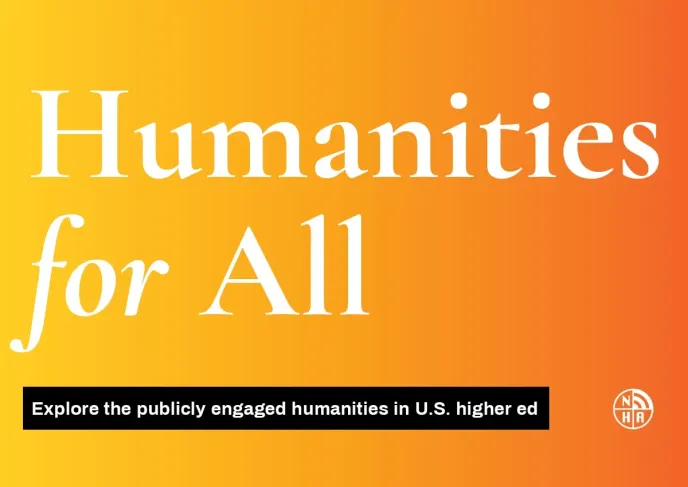Highlighting New Projects on Humanities for All: Spring 2021

We are pleased to announce the addition of new projects to the Humanities for All database! This season, we are highlighting projects that are launching multi-year efforts to preserve community histories and stories. Still in the early stages of development, these long-term projects train undergraduate and graduate researchers in preservation methodologies such as oral history interviewing, digital archiving, and facilitating community dialogues and workshops. They demonstrate a vested interest in the communities with which they are collaborating, and frequently depend upon existing, mutually-beneficial relationships with community organizations and nonprofits. Several of these projects are supported by major grants from external funders such as The Andrew W. Mellon Foundation, state humanities councils, the National Endowment for the Humanities (NEH), and the Whiting Foundation that share a commitment to seeding and sustaining cultural preservation activities. This financial support allows for the purchase of equipment for community organizations that helps sustain their preservation work beyond the close of the partnership, the long-term maintenance of digital archives and websites, and compensation for participants' time and energy. Below, we highlight a few compelling initiatives we have added and encourage you to follow along as these projects evolve. You can access the full list of newly-added projects via the panel to the right.
At the Southern University at New Orleans (SUNO), a historically Black college located in the Pontchartrain Park neighborhood in New Orleans, Clyde Robertson is working to document the stories of Pontchartrain Park’s first residents as part of The Pontchartrain Park Pioneers Project, an NEH-funded oral history and digitization project. Built between 1955 and 1961, Pontchartrain Park is a subdivision of single-family houses with primarily African American residents in eastern New Orleans. Many of those who purchased homes in Pontchartrain Park were World War II veterans who were eligible for financing through the G.I bill and barred from purchasing in other neighborhoods through discriminatory “redlining” practices. SUNO was founded 1956 as a college that would serve the Pontchartrain Park community and its surrounding Black residents. Robertson’s oral history project aims to shed light on the experiences of the neighborhood’s first residents and incorporate these interviews into SUNO curricula to teach students about the interconnectedness of campus and community.
At Florida International University’s Wolfsonian Public Humanities Lab, Director Rebecca Freidman and Deputy Director Julio Capo are launching a three-year Mellon-funded project aimed at supporting the preservation, creation, and narration of stories about underrepresented communities in South Florida. Community Data Curation: Preserving, Creating, and Narrating Everyday Stories will partner with eight South Florida archives, nonprofits, community centers, and museums to help digitize and preserve community stories. Student interns will work with community partners to record oral histories, develop new archives, and digitize current records, with the Wolfsonian providing students with necessary training. To ensure that these projects are sustainable and remain accessible to all in the community, partner organizations will be supplied with technical equipment to keep. Similar to Robertson’s efforts to incorporate oral histories into SUNO’s humanities curricula, this effort coincides with FIU’s development of an interdisciplinary Miami Studies program and curricula, which, according to Capo, will “center the history, literature, culture, language, art, architecture, politics, and overall humanistic experiences of the diverse people of the Greater Miami area.”
At NYU’s Glucksman Ireland House and Center for Irish Studies, the Black, Brown, and Green Voices project has begun a targeted documentation of the life histories of Black and Brown Irish Americans. Funded in part by Ireland's Department of Foreign Affairs and Trade through the Consulate General of Ireland in New York, the project builds upon the ongoing work of the Oral History of Irish America Project, an Irish Studies Center initiative that began in 2005 and has collected over 350 oral history interviews that document Irish Americans’ experiences with ethnic identity. The Black, Brown, and Green Voices project aims to explore how intersections of race and ethnicity have framed a sense of Irishness. Built on existing community relationships and partnerships, the project opened in the spring of 2020 with a series of community conversations in collaboration with the Consulate General of Ireland for New York, NYPL Schomburg Center for Research in Black Culture, and the African American Irish Diaspora Network.
At Cornell University, Rural Humanities is a campus-wide, Mellon-funded initiative housed at Cornell's Society for the Humanities that uses the tools of the humanities to communicate the range of experiences of rural Central-Western New York. One project funded through this initiative, Civic Storytelling in Rural Communities, works with local schools and community organizations to provide teachers and students with storytelling, media, and design skills to help them communicate about issues related to rural life with different stakeholders including parents, administrators, and policymakers. As a part of the Civic Storytelling initiative, participants are developing a Civic Story Kit that includes project ideas, examples, and resources that can be used by other campuses and communities. Other community preservation projects funded by the Rural Humanities initiative include Dark Laboratory, which uses media technologies to explore the intersections of ecology and Black and indigenous experiences in upstate New York. Investigating Rural History is an engaged research initiative with the intention of exploring the possibilities for collaboration between local history centers, the local community, and Cornell. Researchers and librarians will work with these centers to assess the extent of their archival collections, determining how they can be strengthened through partnership.
Check out the new projects on the right, and help us build our database by submitting new listings.